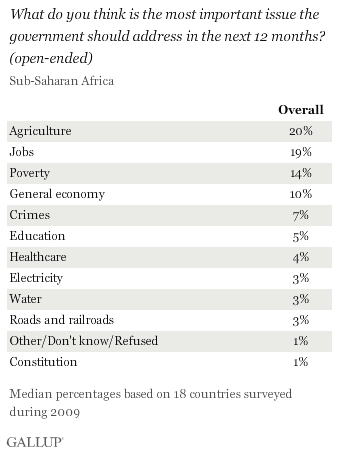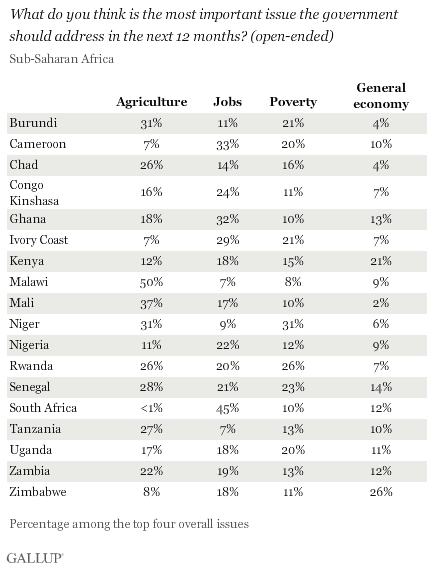WASHINGTON, D.C. -- As the United Nations prepares for its September summit on the Millennium Development Goals, Gallup surveys in sub-Saharan Africa find residents are most likely to spontaneously mention agriculture (20%) and jobs (19%) as the most important issues their governments should address in the next 12 months. A median of 14% across 18 countries surveyed name poverty and 10% mention the economy in general.

Each of these top four issues -- agriculture, jobs, poverty, and the economy -- is tied to Millennium Development Goal No. 1: to eradicate extreme poverty and hunger. Josette Sheeran, executive director of the United Nations World Food Programme, stated recently that Goal 1 is among the worst performing targets and is in jeopardy of not being met.
Gallup data also highlight the different emphasis that some residents place on the top two problems -- agriculture and jobs. Sub-Saharan Africans in rural areas, for example, are most likely to name agriculture as the most important issue (median of 21%), while those in urban areas name jobs as the top issue (median of 23%). For sub-Saharan Africans in rural areas, agriculture often serves the same function as a job.
Overall, agriculture was the most frequently named issue in seven countries, all predominantly rural, and jobs were cited most often in six. Residents of Malawi, a country with more than 75% of the population living in rural areas, are the most likely to name agriculture (50%). While less than 1% of residents in South Africa, a relatively urbanized country, identify agriculture as the top problem. South Africans, however, were the most likely to mention jobs (45%).

Improvements in the four areas that residents identify as the top priorities for government would likely provide them with the means to overcome the twin problems of extreme poverty and hunger.
For complete data sets or custom research from the more than 150 countries Gallup continually surveys, please contact worldpollpartners@gallup.com or call 202.715.3030.
Survey Methods
Results are based on 18,000 face-to-face interviews with adults, aged 15 in older, conducted in 2009. A minimum of 1,000 interviews were conducted in each of the following countries: Burundi, Cameroon, Chad, Congo Kinshasa, Ghana, Ivory Coast, Kenya, Malawi, Mali, Niger, Nigeria, Rwanda, Senegal, South Africa, Tanzania, Uganda, Zambia, and Zimbabwe. For results based on the total sample of national adults, one can say with 95% confidence that the margin of error ranged from a low of ±3.5 percentage points in Ivory Coast and Niger to a high of ±4.8 percentage points in Senegal. The margin of error reflects the influence of data weighting. In addition to sampling error, question wording and practical difficulties in conducting surveys can introduce error or bias into the findings of public opinion polls.
